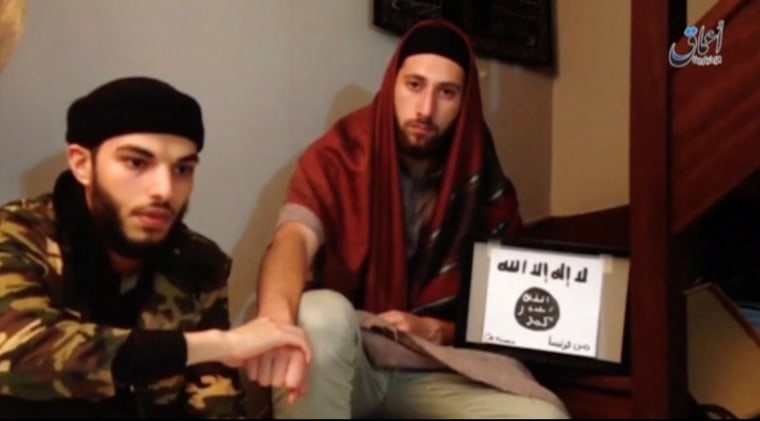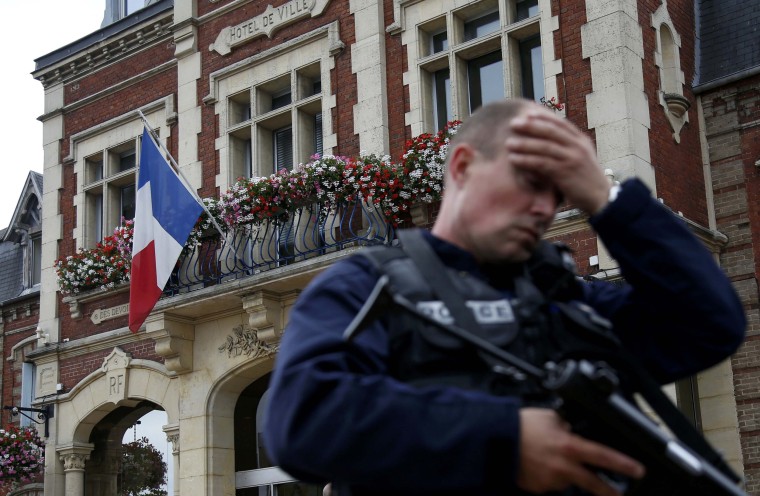LONDON — France is facing questions over its monitoring of extremists after both of the attackers who slit the throat of an elderly priest were known to authorities - including a teen who twice tried to wage jihad in Syria.
Adel Kermiche, 19, was intercepted and arrested as he traveled to fight alongside ISIS using family members' identity documents two times last year.
He was put under house arrest in his hometown of Saint-Etienne-du-Rouvray near Rouen, Normandy, with an electronic surveillance ankle bracelet after a judge freed him, terror prosecutor Francois Molins said.
However, the bracelet was deactivated for a few hours every morning as part of the surveillance agreement, giving Kermiche the chance to murder 85-year-old Rev. Jacques Hamel during Tuesday’s morning Mass.
Kermiche and his accomplice, later identified as 19-year-old Abdel-Malik Nabil Petitjean, held five people hostage — Hamel, two nuns and an elderly couple — in Saint-Etienne-du-Rouvray before slashing the priest's throat and seriously wounding the other man. Police fatally shot both attackers as they left the church.
Kermiche was one of 1,100 French citizens or residents who want to travel to the Middle East to fight alongside ISIS or who have already been and come back, according to government estimates. Security services had opened a special file on Petitjean on June 29 amid suspicions he had been radicalized, a police source told Reuters.
The ISIS-linked attack piles pressure on intelligence services and legal procedures in a country still under a state of emergency that began after November’s coordinated attacks in Paris that left 130 dead.
“We may have had the possibility to check on this guy. If he was released without any treatment or any evaluation of his dangerousness to society, there was a failure — period,” center-right French senator Nathalie Goulet told the BBC.
She added: “You cannot predict everything but … if the guy was effectively in jail for radicalization and released … without any treatment, this thing becomes predictable.”

Kermiche first tried to travel to Syria in March 2015 but was arrested in Germany. Upon his return to France he was placed under surveillance and barred from leaving the Saint-Etienne-du-Rouvray area. Less than two months later, he slipped away and was intercepted in Turkey making his way towards Syria again.
Although he was wearing an ankle bracelet on his release from prison in March, a neighbor and school acquaintance remembered him as a normal teenager who became obsessed with hardline interpretations of the Quran after the deadly attack on Charlie Hebdo magazine in January 2015.
"He tried to indoctrinate us," said the 18-year-old, who gave his name to reporters only as Redwan. “He was saying that we should go [to Syria] and fight for our brothers.
Kermiche told his people around him that France was "the land of unbelievers … that we should not live here," Redwan said.
France's security services, already stretched after eight months under a state of emergency, have strained ever further since an attack in the southern city of Nice on July 14 that killed 84 people.
Kermiche was one of 112 people in France released into the community under some kind of court-imposed supervision relating to terrorism offences, according to Le Figaro newspaper.
French Prime Minister Manuel Valls said in March that 609 French nationals or residents were currently fighting in Syria or Iraq, including 283 women and 18 minors. Almost 170 others have been killed, and some 300 more have returned and are living in their communities, he said.
"Almost 800 would today like to go to these wars zones, according to intelligence services," Valls said, adding that about 1,000 people in France were being monitored by authorities. "Each day [we] ... trace networks, locate cells, arrest individuals,” he said.
France is not alone in having to confront a extremist threat at home. Governments across Europe have been tightening anti-terrorism laws as the Syrian conflict enters its sixth year, agreeing to share more intelligence and taking down radical websites to try to stop their citizens from going to fight in the Middle East and bringing militancy home.
Britain’s most senior police officer told NBC News that the sheer number of individuals being monitored means cases have to be prioritized.
Bernard Hogan-Howe, commissioner of London’s Metropolitan Police, said: “No doubt, it’s hard. It’s a really difficult decision."
He added: “We have got many people who we are worried about ... either involved in or supporting terrorism so all the time we are trying to assess: ‘Are they thinking about it? Are they getting together equipment to do something about it? Are they working with other people to conspire to organize it?’"
“It’s a real challenge to get enough intelligence because we cannot follow everybody all the time so we have to make rational choices,” Hogan-Howe add.
Jimmy Deliste, general secretary of France’s biggest prison workers’ union, said that it was impossible to track the movements of all individuals wearing court-ordered ankle bracelets.
"It’s not like the U.S. where, in case of non-compliance, an armed [officer] arrives at the person's home,” he told Le Figaro. “Beyond the [jail] walls, individuals are not controlled. We are in a trust agreement. Can we trust a man who tried to reach [ISIS] in Syria? I think the answer is in the question.”
"We've been talking about the danger of the global jihadist insurgency. This is what it looks like."
Even when an electronic bracelet triggers a warning, probation officers are overwhelmed by the number of alerts, he said.
Former French President Nicolas Sarkozy, who is expected to enter a conservative primary for next year's presidential election, accused the country’s socialist government of being soft.
"We must be merciless," Sarkozy said in a statement to reporters. "The legal quibbling, precautions and pretexts for insufficient action are not acceptable.”
France’s center-right opposition wants all Islamist suspects to be either held in detention or electronically tagged to avert potential attacks.
However, President Francois Hollande in March dropped plans to strip foreign-born suspected jihadis of their French passports and deport them.
Marine Le Pen, the leader of the far-right National Front, said both Sarkozy's and Hollande's parties had failed on security.
"All those who have governed us for 30 years bear an immense responsibility. It's revolting to watch them bickering!" she tweeted.
Britain also plans to enforce new laws to seize the passports of suspected terrorists, but a former intelligence chief said European countries should keep their doors open to repentant fighters.
"Many of the people who have been most successful in undermining the terrorist narrative are themselves ex-extremists," Richard Barrett, a former terror chief at British intelligence services MI5 and MI6, told The Guardian newspaper.

It is a view echoed by CAGE, a British non-profit that campaigns on behalf of terror detainees including former inmates at Guantanamo Bay. It has even called for returning jihadis to be given pastoral help “to help them reintegrate into society.”
“The suspension of conventional justice in France with the state of emergency hasn’t really been effective at all in preventing attacks,” said CAGE spokesman Ibrahim Mohamoud. He added that the attacker in Nice “didn’t fit the profile at all” of a jihadi and suggested that terror attacks were a predictable “blowback” from Western intervention in the Middle East.
The cluster of towns outside Rouen where Kermiche and Petitjean launched their attack has been inked to ISIS before.
A micro-cell of recruits from the area included a Frenchman seen cutting the throat of a Syrian soldier in a November 2014 video. Maxime Hauchard, the jihadi in the video, was among at least four people who met at a local mosque and later left to join the extremists.
But Haras Rafiq, managing director of British anti-radicalization Quilliam Foundation think tank, described Tuesday's attack as a turning point.
"What these two people have done is ... shifted the tactical attack to the attack on Rome ... an attack on Christianity," he said.
As Europe becomes painfully inured to a summer of repeated bloodshed, the extremists are looking for greater ways to shock, Rafiq said. "This is going into a house of God. This is attacking and killing a priest."
He added: "We've been talking about the danger of the global jihadist insurgency. This is what it looks like." he said.
